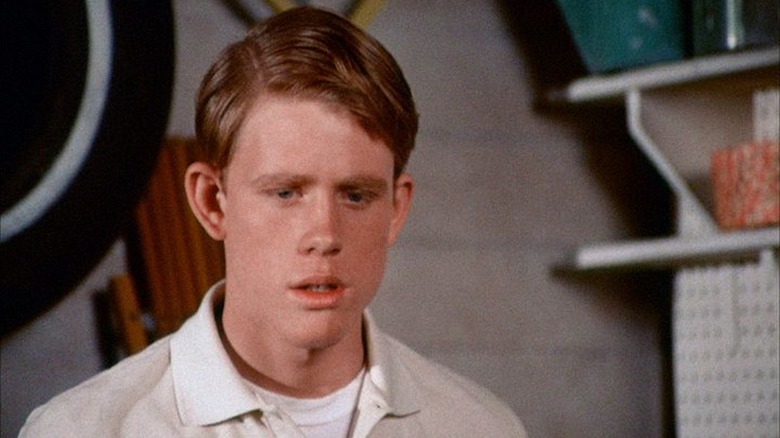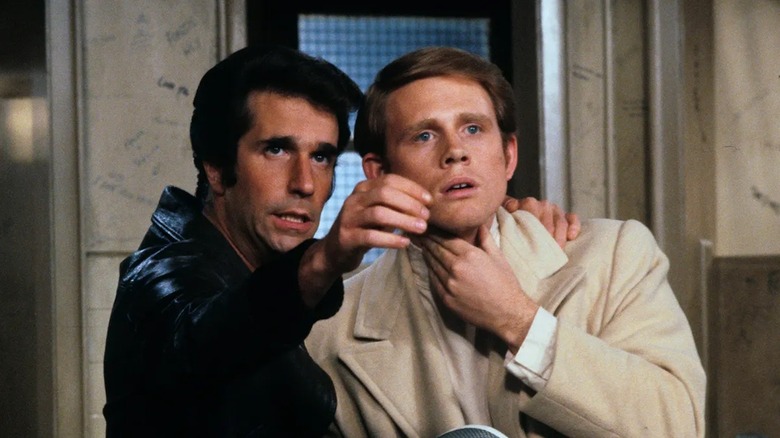Why Ron Howard Threatened To Quit Happy Days Over Fonzie
For much of its 11-season run on ABC, "Happy Days" was one of the most popular shows on network television. Set during the 1950s, the sitcom shamelessly catered to Baby Boomer nostalgia, but also connected strongly with Gen X-ers who enjoyed the antics of its appealing young cast. The music, fashion, and fads might have belonged to their parents, but kids could easily relate to the Cunninghams' lovingly contentious family dynamic, as well as the high-school tumult faced by Richie (Ron Howard), Ralph (Donny Most), and Potsie (Anson Williams).
So, it might come as a surprise to learn that the series was teetering on the brink of cancellation when, after a promising debut season that ranked 16th in the Nielsen ratings, it hemorrhaged viewers and finished 49th after its second season. When creator Gerry Marshall was given a third season to right the ship, he turned the show into a standard multi-camera sitcom that would be filmed in front of a live studio audience. This major aesthetic alteration gave "Happy Days" the giddy charge of a staged comedy, with entrance applause for the main characters and roaring laughter in response to the clownish shenanigans of Ralph and Potsie.
It's possible, however, that "Happy Days" still would've floundered in the ratings had Marshall not made one other creative change. The decision turned one of its cast-members into a full-blown TV superstar, but it initially left the series' top-billed actor, Howard, miffed enough that he was ready to walk off the show.
Ron Howard wanted no part of Fonzie's Happy Days
In a 50th anniversary retrospective published by The New York Times in 2024, Howard recalled not being down at all with one element of Marshall's Season 3 retooling. While he admitted to being "terrified" at first about performing in front of a live studio audience, Howard quickly found it to be "an exciting experience." His unhappiness, however, was in response to a significant change in the direction of the series. According to Howard:
"The other idea was to move the Fonzie character front and center. It was kind of a reckoning for me because the focus of the show shifted, and yet that was our way to win. The only thing I ever said to the bosses or the executives is, 'What's happened here with Fonzie is great. Just make sure that you understand, too, that we have a real chemistry here, and we think of ourselves as an ensemble.'"
Though Henry Winkler, who became a household name as Fonzie, was the prime beneficiary of this move, he wasn't thrilled with it either. As he told the Times, "They came to me at ABC and they wanted to change the title to 'Fonzie's Happy Days.' I said, 'If you do that, it is an insult to everybody I'm working with. Why fix something that isn't broken?'"
Howard was a rising star in his early 20s at the time, so it took some chutzpah for him to put his foot down over this proposal. "I told them I would leave," he said. "I don't think I contractually could have. But I told them if you really want to change the name of the show to that, I would rather go back to USC and film school and what I was doing before the show launched."
Ultimately, ABC and Marshall relented. Howard stayed on, and the rejiggered "Happy Days" became the top-rated show on television by the end of its fourth season. And while Howard never did get his degree from USC, he nevertheless found his way behind the camera and eventually became one of the most successful directors in Hollywood. Chances are, Howard has even directed one or more of your favorite movies.

